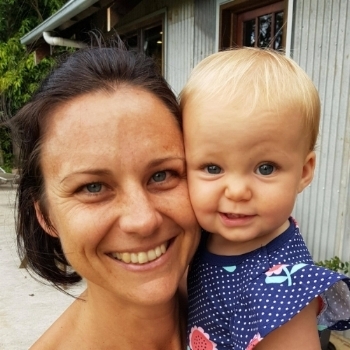
How does an Occupational Therapist (and mum) study for a lifestyle medicine board certification exam?
The reality hit me about 3 hours into the 30 hour online course. What the hell have I signed up to this for? I’m a new mum with a 7 month old baby, I’m going back to work 2 days a week and I am chronically, overwhelmingly sleep deprived. When I signed up for the certification exam 6 months ago I think I had some wild crazy notion that I would be enjoying a full nights sleep & this course would be the perfect way to keep me occupied while I stayed at home looking after my bub. Of course this bub would be soundly sleeping for a couple of hours during the day and blissfully playing by herself while I studied. Clearly I was completely and utterly delusional and my daughter did not get this memo! Turns out she is the ultimate 20-30 minute cat napper and basically fights going to sleep with the utter determination and stubbornness that I would normally adopt when studying for an exam! Oh the irony! So you can imagine me, rocking this bub to sleep, singing, bouncing, feeding, doing everything I can to cajole her into dreamy sleep, then when finally she is asleep, I don’t dare put her down in the cot because that is her cue to wake up and party…..so I somehow hold her, get my laptop computer, sit down ever so slowly on the lounge, precariously position my laptop beside me, login to the online course, hook up my headphones and then start listening to the lectures, trying to pick up where I left of last time and focus enough to take in the info. Aaannnnd just when I’m in the flow of things…….bam she’s awake again and ready for my 100% attention! What was I studying again…..and why? Lifestyle medicine and how to adopt a lifestyle that promotes health and wellbeing?! This was beyond ludicrous, but I was in too deep to back out…….(i.e. I’d payed my exam registration fee and my $700 odd for the compulsory course). What on earth was I to do?
Was I going to stress myself out, stay up late to study and suffer even more sleep deprivation? Was I going to ditch the course and give up? Was I going to worry about this every waking moment and add even more pressure onto myself? Was I going to just have a crack, do the best I could and risk the embarrassment of failing the exam? I had to make some decisions. On reflection, the decisions I made were confirmed through the teachings of the course and it gave me confidence that even if I didn’t pass the exam, I was living and breathing lifestyle medicine. Either way, this would help me help others….and if I didn’t pass the exam this year, there is always next. I could handle the embarrassment if I failed because the lessons were worth it!
Here’s my top lifestyle medicine tips that got me through the study;

WTW
WALK THE WALK; no point learning all this healthy lifestyle stuff if I’m not doing it myself. No one wants to go to a practitioner for health advice and see that they are clearly unhealthy themselves. I used to think this meant I needed to have perfect health for my advice to be valid. But no, I have learnt that it just means I need to be adopting the lifestyle habits that I expect my patients to adopt. I was heartened to see in the course content, research surrounding how a physicians health and level of engagement in a healthy lifestyle effects whether they address things like overweight and exercise with their patients. While I was studying, this meant that I needed to maintain all of the daily and weekly rituals that help me stay healthy. Things like going for a run with my running group, getting lots of sunshine, doing a meal plan at the beginning of each week and sticking to it, shopping at the markets for fresh organic local fruit and veg….and the list goes on. If I dropped some of those things it certainly would have made more time for study, however, the consequences are not worth it and it’s during these times of pushing harder and doing more that these habits become even more important!
PR
PRIORITISE ROLES; our occupational roles are so vital to our sense of self & hence our emotional & physical wellbeing. This is one of the fundamental philosophies that my degree in Occupational Therapy is based on. When people are engaged in occupational roles it gives life a purpose and it usually gives your body physical activity. Two things which have been shown through epidemiological studies such as the Blue Zones are paramount to a healthy and long life. The key is, how to prioritise roles when you are taking on more than one or two things. While studying, my roles as a mum, practitioner, student & partner started to conflict quite a lot and I had to step back and look at how to make it work. My answer was that some days, being a mum had to be my priority and I had to completely ditch the roles of student and practitioner. At first this caused me to worry about the other roles and worry that I wasn’t getting enough study done. However, once I learnt to accept this and roll with the ebb and flow of life, things became a lot easier and ironically, I got more done.
MBSR
(sounds like a disease doesn’t it!) MINDFULNESS BASED STRESS REDUCTION; how much unnecessary suffering was I going to put myself through? When I hit that realisation of “holy crap I might have got myself in too deep here”, my stress levels definitely were on the up and up. I started to remember those awful feelings as a uni student worrying if you were going to pass an exam like your life depended on it. Thankfully, 20 years down the track, I have a few more tools in the bag to help cope with stress and I was so glad to see that this course had a module in emotional wellness. FINALLY we have sensible sound stress reduction practices making their way into medicine and furthermore, we have some good research showing the links of chronic stress on immune suppression and therefore chronic disease. But equally, some good research on the benefits of mindfulness and meditation on stress reduction. During the process of studying I certainly had to up the anti on my stress reduction practices. The easiest one for me being abdominal breathing…….just taking moments short or long to breathe deeply into my abdomen and feel the relaxation effects.
PA
While I would like that to mean I had a personal assistant, unfortunately such luxuries have not yet come to me…..but I wont stop wishing! PHYSICAL ACTIVITY was an absolute key during this study process and for life in general. It is probably the single most important aspect of maintaining my physical and emotional wellbeing and after seeing all of the research presented in the course, it is probably the single most important thing everyone can “do” in their daily life. The best thing is that it ticks so many boxes at once in terms of the benefits for health, both mental and physical. One of the things that stood out to me through the research presented was that physical activity had a preventative effect and a treatment effect for people despite being overweight and obese. So, even if weight loss was not occurring, the benefits of simply being physically active were still present. As I am only 9 months along from giving birth, my physical fitness is not what it used to be, but, I can tell you that even despite my sleep deprivation, when I get up early and go for a run I feel so much better in my mind and body! My ultimate stress relief, feel good “pill” is my Friday morning triathlon. Run, ocean swim and coffee! All done with my partner, my daughter in the pram and with friends which makes it 10 fold more enjoyable and fun.
So as I sit here writing this, I am still waiting to hear if I passed the exam. My fears of being embarrassed if I fail are still there. No one wants to fail an exam! Multiple choice exams are tough. There were questions that I definitely knew the answer to, questions that I know tricked me and questions that I thought were not reflective of the content taught. However, I strongly feel that the information I learnt and the consolidation of knowledge was worth it, despite the outcome, because it has reinforced and enhanced my ability to prescribe lifestyle changes, particularly for those with chronic diseases such as obesity, type 2 diabetes and cardiovascular disease. It is so encouraging to see that lifestyle is being brought to the forefront as the first line of defence against our growing epidemic of lifestyle diseases. Lifestyle is being recognised as the CAUSE and the CURE and it will be fantastic to see more and more medical and allied health professionals using lifestyle as the prescription first, with medications as an adjunct or secondary option.
And, if I pass then I am one of the first in Australia, and the world, to become certified to an international standard in Lifestyle Medicine. That’s pretty cool!
Jac Edser
This article first appeared on www.jacedser.com.au on November 27th 2017.



